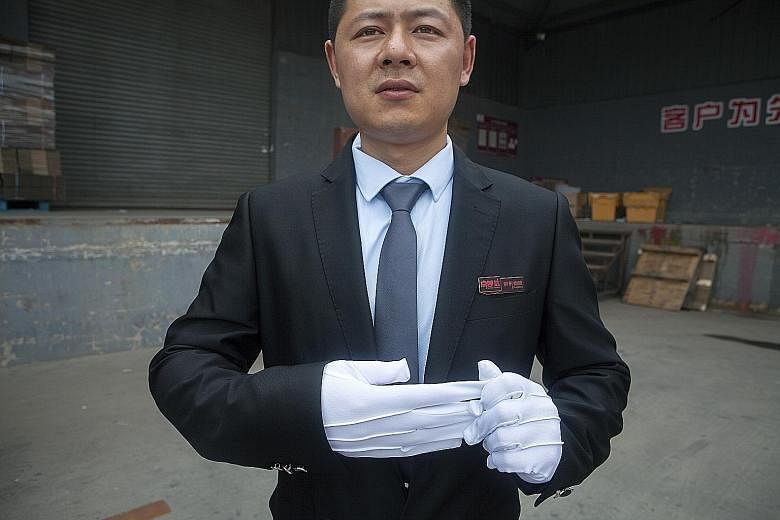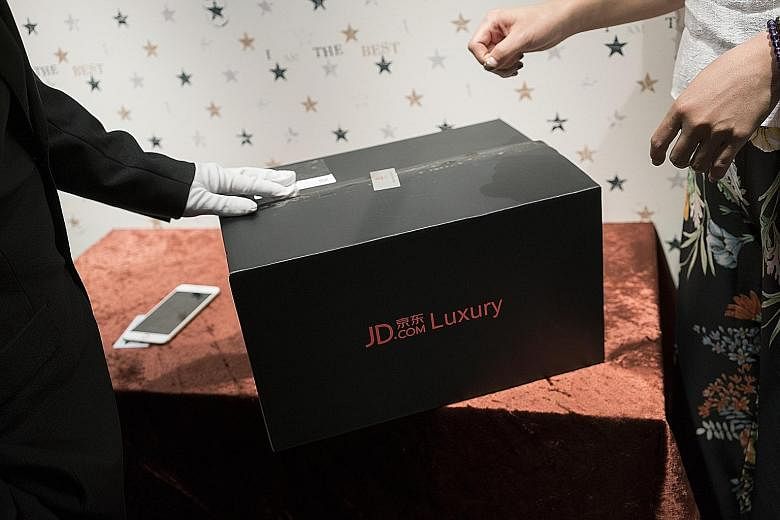BEIJING • In China, legions of delivery personnel power the world's largest e-commerce boom.
Known for their careening three-wheeled carts, they terrorise pedestrians and sometimes dump their packages on doorsteps and desks with the delicacy of a restaurant employee tossing out yesterday's leftovers.
Then, there is Mr Tang Hongliang, who is part of an ambitious effort to bring some sparkle to the business - and perhaps, help revive the fortunes of the world's makers of high-priced handbags and watches.
Decked out in a black suit, dark grey tie and white gloves, Mr Tang does not look like a typical Chinese package courier. Instead of piping-hot noodle lunches, he delivers a US$2,400 (S$3,300) designer handbag.
Rather than a three-wheeler, he drives an electric car to transport expensive cargo. In the time he makes one or two deliveries, the typical Chinese courier would have made about 150.
"Efficiency is of course important," said Mr Tang, who works for online retailer JD.com. "But serving the customer is the most important."
To court the luxury market, companies like Alibaba and JD.com are using their vast customer base to offer upscale retailers support on issues like digital marketing, pricing, customer services and, in the case of Mr Tang, delivery.
"The most difficult thing to overcome is the experience for the shoppers," said Mr Xia Ding, president of JD.com's fashion division. "But because we own the logistics, we are really able to deliver luxury goods in a way that makes shoppers feel like they are getting the same special experience as they get offline."
Chinese shoppers have long dominated the global luxury market. But in the last two years, a continuing anti-corruption campaign and an economic slowdown led to a decline in Chinese demand for luxury, contributing to an overall global slump.
Still, last year Chinese shoppers accounted for 30 per cent of global luxury purchases, according to a report by Bain & Co.
Until recently, however, many Chinese luxury purchases were being made overseas or through daigou - personal shoppers who buy goods abroad and bring them into China, avoiding the country's hefty taxes.
That started to change two years ago when, in an effort to combat grey-market sales, a number of high-end luxury brands led by Chanel took steps to reduce the price gap between goods in China and overseas. At about the same time, the Chinese government also stepped up efforts to crack down on daigou shoppers.
As a result, brands have seen a shift in luxury shopping habits, with more and more Chinese consumers now choosing to buy at home rather than abroad. This so-called reshoring has caught the attention of Chinese e-commerce companies, causing major players, as well as smaller luxury-focused companies, to invest aggressively in the luxury sphere.
But so far, China's e-commerce companies have struggled to persuade top international luxury brands to sell on their platforms.
Luxury companies have long been concerned that with e-commerce, it would be impossible to replicate the gilded, perfectly curated in-store shopping experience. Brands also worry about their products being sold next to counterfeit and grey-market items - an issue that Alibaba, in particular, has struggled with in the past.
Still, there is no ignoring the reality that Chinese consumers love shopping online. Chinese shoppers spent US$758 billion online last year - more than the United States and Britain combined, according to official data, buying everything from toilet paper to luxury cars.
Ultimately, e-commerce giants like Alibaba and JD.com are hoping that the allure of their vast consumer base will be too difficult for luxury brands to resist. Shiny add-on features like the white- glove delivery service may make swallowing the e-commerce pill a little easier for the brands.
NYTIMES


